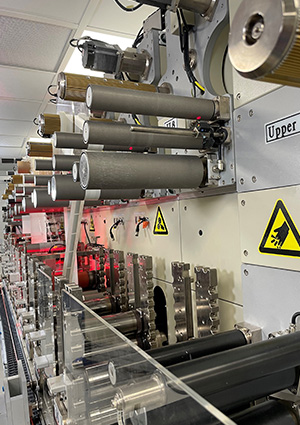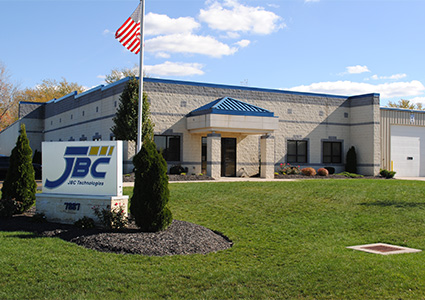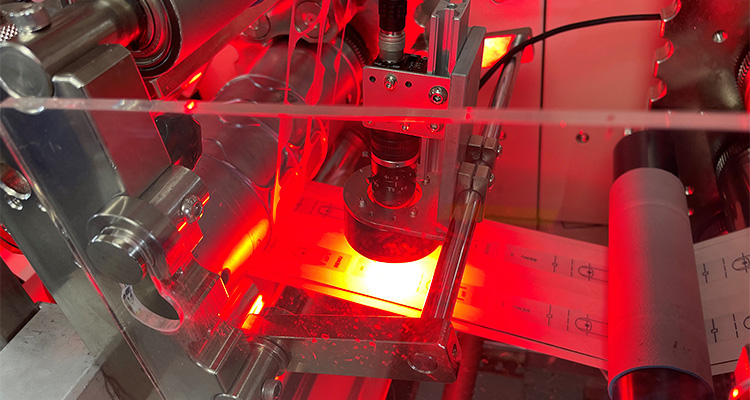Read on to learn how JBC Technologies is revolutionizing precision die-cutting
With locations in four US states, JBC Technologies (JBC) is a prominent engineered solutions provider that specializes in high volume precision die-cutting and flexible materials converting. Leveraging its extensive process engineering expertise and state-of-the art vertically integrated converting equipment, the company fabricates complex parts made from diverse materials for customers all over the globe. In addition to high volume custom die-cutting, JBC offers diverse value-added services, including digital cutting, slitting, laminating, embossing, micro-perforating, spooling, rapid prototyping, ultrasonic welding, printing, and clean room manufacturing. The organization’s CEO, Todd Wright, tells us more about its origins and evolution. 
“In 1988, Joe Bliss, a mechanical engineer by training, founded JBC in Ohio together with his brother. Originally started as an O-ring distribution business, the company soon ventured into die-cutting custom gaskets. Subsequently, it blossomed into the full-fledged converting business it is today,” he opens.
“Although Joe is no longer actively working in the business, he remains on our board, and we continue to uphold his passion for helping solve our customers’ challenges through engineering. This mission was the driving force behind our growth in the past and is our key priority to this day. As an engineering-minded organization, we strive to undertake work that other converters may consider too difficult or even impossible. Therefore, we tend to focus on end markets that value this type of approach. More specifically, we are focused on growing within the medical and medical devices, electric vehicle (EV) battery solutions (especially in terms of thermal management), battery energy storage, and aerospace sectors. These end industries lend themselves to more complex and sophisticated solutions that demand a higher level of engineering and equipment capabilities, which is exactly where we excel and provide value to the marketplace.”
Todd elaborates on what these complex capabilities entail. “Our core expertise lies in die-cutting. We distinguish ourselves, not only with our extensive engineering expertise, but also with a very diverse stable of equipment that gives us the flexibility to cost-effectively fabricate unique custom parts for a broad range of end applications. Our basic, wide-format platen press die-cutting presses enable us to cut very large parts and multiple plies efficiently, reducing our use of raw materials. Our highly precise narrow-web platen and rotary die-cutting presses enable us to laminate, print, and ultrasonically weld in-line, achieve tight tolerances and undertake the most sophisticated die-cutting challenges. Highly complex parts and solutions fabricated using the rotary die cutting process form the base of our business.
“We provide value for our customers in many other ways as well. For example, by utilizing Atom FlashCut cutters, laser cutters, and water jets for digital cutting, we avoid the need for tooling. These processes are ideal for prototypes, short runs, and kitted parts. Somewhat uncommonly for converters, we also specialize in automation. In practice, this means we use robotics and automation to integrate our die-cut components with our customers’ parts, thereby providing a comprehensively integrated solution. Additionally, we offer material treatment through corona and plasma treating and provide embossing and micro-perforating for thin gauge aluminum and steel,” he continues.
 Delving deeper on the subject, Todd reveals the range of technologies JBC leverages to improve its manufacturing efficiency. “In terms of our rotary equipment, we have implemented various digital upgrades to enhance our control over material usage. This is vital to our business as we do not manufacture any materials ourselves. By upgrading our equipment to incorporate computer technology and even artificial intelligence (AI) in some cases, we can achieve better yields and efficiencies. It is worth mentioning that we own and extensively use five Delta ModTech machines, which are some of the finest rotary die-cutting machines in the market. We also utilize a Dory Converting Systems machine that features integrated camera systems and is one of only seven of its kind in the US. As the market and our customers are increasingly looking to automate and become more efficient, investing in high-end rotary equipment allows us to provide them with parts that they can use in automation.
Delving deeper on the subject, Todd reveals the range of technologies JBC leverages to improve its manufacturing efficiency. “In terms of our rotary equipment, we have implemented various digital upgrades to enhance our control over material usage. This is vital to our business as we do not manufacture any materials ourselves. By upgrading our equipment to incorporate computer technology and even artificial intelligence (AI) in some cases, we can achieve better yields and efficiencies. It is worth mentioning that we own and extensively use five Delta ModTech machines, which are some of the finest rotary die-cutting machines in the market. We also utilize a Dory Converting Systems machine that features integrated camera systems and is one of only seven of its kind in the US. As the market and our customers are increasingly looking to automate and become more efficient, investing in high-end rotary equipment allows us to provide them with parts that they can use in automation.
“Beyond that, we have invested in a digital printer and added printing capabilities to our press. This investment allows us to bring multiple materials together, print, and die cut them all in one pass, making our process much more efficient than doing each of those tasks separately and assembling everything later. Not only does this complete solution improve our production efficiency it also helps our customers streamline their operations and increase efficiency on their end,” he informs.
Before concluding our discussion, Todd emphasizes another key development taking place at JBC. “We have made a significant investment in a medical facility located in Elk Grove Village, Illinois, just outside of Chicago. Shortly thereafter, we transformed it into a full clean facility with clean rooms. As we anticipate the continued growth of wearables and medical devices well into the future, we continuously invest in both capabilities and expertise within this facility,” he goes on.
Thanks to JBC’s dedication to tackling complex engineering challenges, many more industries are sure to benefit from its unique solutions and expertise in the years ahead.
